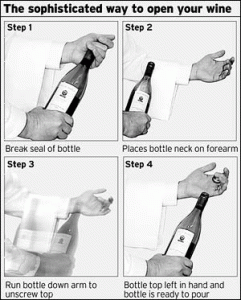Screw vs. Cork
Local Food And Wine
Screw caps, also known as “Stelvin” caps, provide the best seal for bottled wines. Surprised? There have been hurdles in the perception of a wine’s value based solely on whether it has a cork or a screw cap, but the fact remains that traditionally sealed bottles of wine risk developing a case of being “corked.”The term “corked” refers to the taste a wine can develop, which is actually an oxidation problem, from corks due to the substance used to sanitize the cork prior to use for bottling. The substance is referred to as TCA (2,4,6-Trichloroanisole). A “corked” bottle of wine has a musty or mouldy taste to it that has nothing to do with the wine, but rather its reaction to the cork. Stelvin caps allow for consistent aging and keep the wine’s freshness.
Wine lovers who enjoy more complexity in their wines may still reach for a traditional bottle with a cork, but those who enjoy a fresher more “fruity” taste to their wines will opt for the screw cap. Tinhorn Creek, an Okanagan winery who uses Stelvin caps, explains the aging process of a wine:
“Most wine aging reactions occur within the bottle and have very little to do with any oxygen getting through the cork. It is just a matter of molecules bumping into one another in a small container that allows wine to age. The tannin molecules collide and form larger molecules and eventually get so heavy that they fall down to the bottom of the bottle. Once these tannins fall out the wine becomes smoother tasting. This reaction occurs with or without a cork.”Australia, Spain, South Africa, South America, Canada, the U.S. and France are all major winemaking regions who are adopting the Stelvin caps for their wines. Some of the best labels, such as Bonny Doon, have been early adopters of the screw cap. The synthetic “cork” is what most wine afficionados recommend avoiding when possible. Winemakers say these stifle the maturing process of a wine. Some wineries even say that bottles over five years old with a synthetic cap start to acquire a synthetic taste to the wine. More pluses for Stelvin caps (courtesy Tinhorn Creek):
- The bottles are easier to store (they can be on their side, upside down or standing straight up in your cellar).
- You will not encounter bottles that leak through the cork.
- The fruitiness of the wine will stay preserved for longer, thus allowing you to age wines for longer.


No comments:
Post a Comment